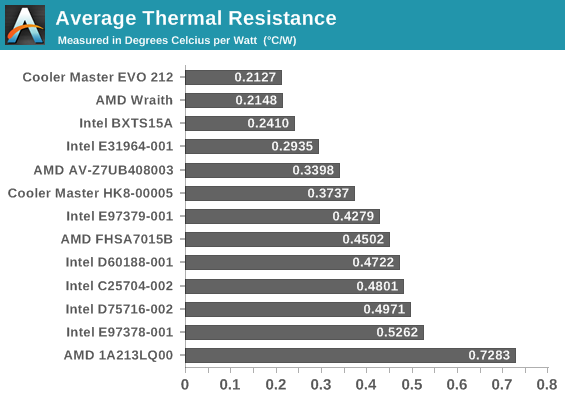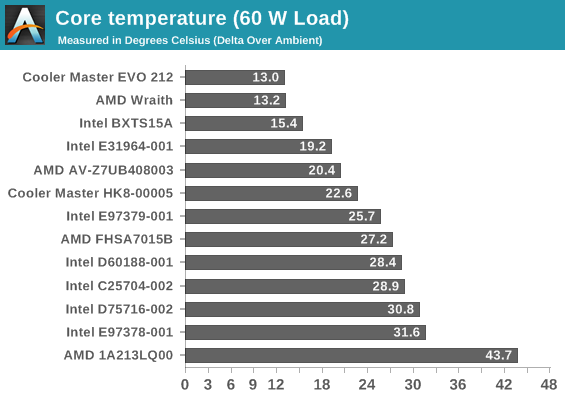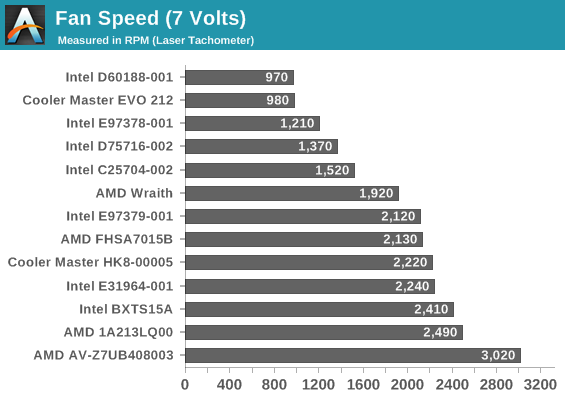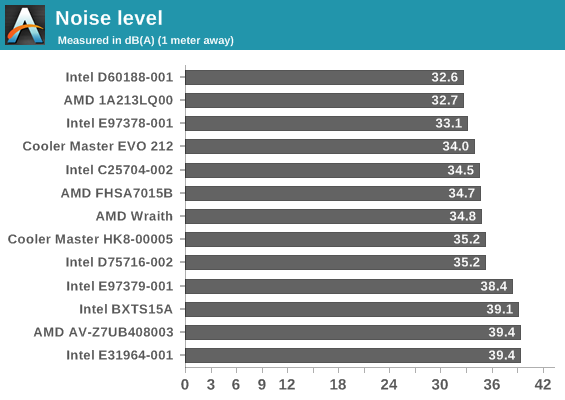Battle of The CPU Stock Coolers! 7x Intel vs 5x AMD, plus an EVO 212
by E. Fylladitakis on July 22, 2016 9:00 AM EST- Posted in
- Cases/Cooling/PSUs
- CPUs
- AMD
- Intel
- Cooler Master
- Cooler
Testing Results, Low Fan Speed (7 Volts)
Intel’s E97379-001 and AMD’s AV-Z7UB408003 coolers are equipped with automatic speed correction circuitry and adjust their speed to the maximum regardless of the input voltage. This renders the majority of basic fan controllers, rheostats and simple fan speed reduction resistors useless. Their speed can only be controlled via a PWM signal from a motherboard. The E97379-001 did have a small speed drop with an input of 6.5V and we included those results, but the AV-Z7UB408003 was rather adamant and devoid of a PWM signal would always automatically correct its speed to 3000 RPM, giving us the exact same performance results as before.

Again, the three most powerful coolers take the top spots at reduced power.

| Core Temperature, Constant Thermal Load (Low Fan Speed) |
Similarly to the 12V results, the EVO, Wraith and BXTS15A are taking the top spots. It's useful to note that EVO 212 and the Wraith are essentially equal as the power increases, with the Wraith being marginally ahead at very high thermal loads.


Putting the two "abnormal" coolers with non-adjustable fan settings aside, the thermal performance of the other coolers decreased almost equally, leaving their standings untouched. The D75716-002 still performs similarly to the C25704-002 and the D60188-001, but the former still is the loudest and the latter still is the quietest of the three. As a matter of fact, the D75716-002 is louder than the C25704-002, even though the fan is slower, hinting that either the fan has a worse engine or the denser fins significantly increased the airflow resistance of the cooler.
We cannot compare the AV-Z7UB408003 cooler to the rest of AMD’s coolers due to the autocorrecting fan. Nevertheless, we can make a useful observation looking at the Cooler Master’s HK8-00005 performance. Despite it has a slightly lower mass compared to that of the FHSA7015B and virtually the same fan, its thermal performance is much better, showcasing how two simple heatpipes can significantly increase the efficiency of a cooler.
Once again, AMD’s Wraith goes directly head to head with Cooler Master’s EVO 212, only this time the Wraith also compares in terms of acoustic comfort. There is virtually no difference between the two coolers in terms of thermal performance and both are equally silent with their fan input voltage reduced down to 7 Volts. The Intel BXTS15A does compare in terms of thermal performance but falls significantly behind when it comes to acoustics, as the cooler remains clearly audible even with its fan’s speed reduced by nearly 40%.










82 Comments
View All Comments
SetiroN - Friday, July 22, 2016 - link
Such a useful comparison!Let's see which other stock cooler that you will never get to replace your own stock cooler would be better.
/s
SetiroN - Friday, July 22, 2016 - link
I mean seriously, the massive marketing campaign AMD has been doing for this wraith cooler is the epitome of their lack of R&D investments. Makes me so stupidly sad.JoeyJoJo123 - Friday, July 22, 2016 - link
Makes you stupidly sad that they bundle the best stock cpu cooler out of any released ever? Why?It's a cooler that I wouldn't be shamed to choose not to get an aftermarket HSF for, as it's basically just as good as one, and it's one of the only things they can do to get people interested in their CPUs, as they know and you know and I know that their CPUs would be lackluster until Zen potentially comes out with potentially competitive value against Intel CPUs. In other words, they know they're stuck shipping slow CPUs right now, but the least they know they can do is bundle in a pretty neat stock cooler, and that might be enough to sway some buyers in their favor, which isn't a terrible thing, as AMD's already struggling to stay afloat.
SetiroN - Friday, July 22, 2016 - link
How much energy they have to put into marketing their stock cooler makes me sad, yes, because at this point it's the best part of the bundle.When a once great CPU manufacturer has to tell their customers that their CPU is better because... it has a better cooler, I think of the moment I first saw a K7 and tear up a little.
looncraz - Friday, July 22, 2016 - link
AMD hasn't put a lot of energy in at all, they made the cooler, they made a quick video, uploaded it, and everyone else did most of the work. Beyond that, they just list it as a value-add - and it is a very good value-add, indeed.close - Monday, July 25, 2016 - link
Ignore him. He's a troll and not even a very good one. I bet he was hoping for some kind of support. He'll keep repeating the same "the best thing a CPU manufacturer's got going is their bundled cooler" because he somehow thinks that backing out from this stupid statement will make him look even dumber in other people's eyes than keeping it up.nathanddrews - Friday, July 22, 2016 - link
Eh? The AMD Wraith is clearly a kickass stock cooler. I, for one, welcome the opportunity to not need to buy additional bulky HSFs. I've got 212s on most of my PCs. It's nice to know that I don't need to for an FX build.AS118 - Saturday, July 23, 2016 - link
I agree. I can't say this enough, the Wraith is pretty much a 212 in terms of performance yet it is SO easy to install. Don't even have to put on a custom backplate. I really hope Zen CPU's have the Wraith or something similar.I'd never have to buy another 212 again if AMD keeps making these. (As long as I was buying an AMD CPU that had one)
Samus - Sunday, July 24, 2016 - link
Personally I like the direction Intel went in, by not including a cooler at all and reducing the price of the CPU accordingly ($10-$20 vs Haswell)TheinsanegamerN - Wednesday, July 27, 2016 - link
the 6700k is $10 more then a devil's canyon 4790k. The price went UP, not down.